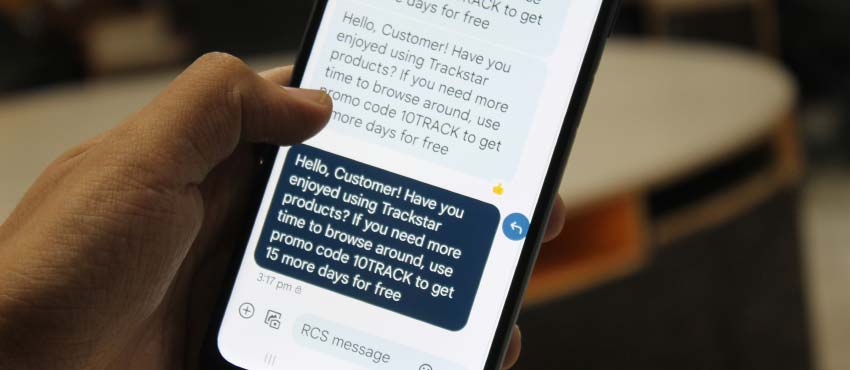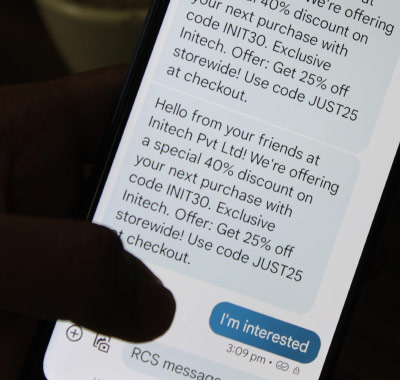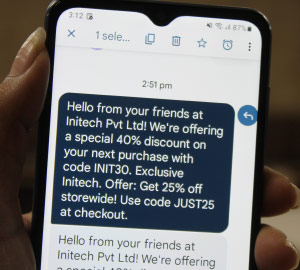Here are some of the key regulations and restrictions to keep in mind:
-
TCPA (Telephone Consumer Protection Act):
In the United States, the TCPA restricts unsolicited SMS messages, automated text messages, and prerecorded voice calls sent to mobile phones without prior express written consent from the recipient. You must obtain explicit consent before sending marketing or promotional messages through a Bulk SMS gateway to U.S. recipients.
-
CAN-SPAM Act:
The CAN-SPAM Act applies to commercial email messages, but it also includes provisions for SMS marketing. It requires businesses to provide a clear and conspicuous opt-out mechanism for recipients who wish to stop receiving messages, and it prohibits deceptive practices in SMS marketing.
-
CTIA Guidelines (U.S.):
The Cellular Telecommunications Industry Association (CTIA) has established guidelines for businesses using SMS marketing in the United States. These guidelines cover aspects such as opt-in and opt-out processes, compliance with carrier-specific rules, and message frequency limitations.
-
CASL (Canada's Anti-Spam Legislation):
CASL governs commercial electronic messages (including SMS) sent to recipients in Canada. Similar to TCPA and CAN-SPAM, CASL requires obtaining consent from recipients before sending commercial messages.
-
Content Restrictions:
Even if you have consent to send messages, there may be restrictions on the content of SMS messages. Avoid sending illegal, offensive, or misleading content that violates local laws or industry regulations.
-
GDPR (General Data Protection Regulation):
If you are sending SMS messages to recipients in the European Union (EU), you must comply with GDPR regulations. GDPR imposes strict rules on the processing and storage of personal data, including mobile phone numbers, and requires explicit consent for sending marketing messages.
-
Industry-Specific Regulations:
Certain industries, such as healthcare and finance, have additional regulations that apply to SMS communications. For example, the Health Insurance Portability and Accountability Act (HIPAA) in the U.S. governs the privacy and security of healthcare-related communications, including SMS.
-
PDPB (Personal Data Protection Bill) - India:
India's Personal Data Protection Bill, once enacted into law, will regulate the processing and handling of personal data, including SMS messages. Compliance with this legislation will be necessary for businesses in India.
-
Country-Specific Regulations:
Many countries have their own regulations and guidelines regarding SMS marketing and bulk messaging. Always ensure you are familiar with the specific laws and rules of each country where you plan to send SMS messages.
-
Opt-Out Mechanism:
Always provide an easy and clear opt-out mechanism for recipients to stop receiving messages from your Bulk SMS service. Honoring opt-out requests promptly is crucial for compliance.
-
Impl itemprop="name"ement a robust consent management system to obtain and store consent records.
-
Keep itemprop="name" thorough records of consent and opt-out requests.
-
Regu itemprop="name"larly update and maintain your contact lists to ensure accuracy and relevance.
-
Work itemprop="name" with a reputable Bulk SMS gateway provider that complies with relevant regulations.
Remember that SMS messaging can be a powerful marketing tool when used responsibly and ethically. By complying with these regulations, you demonstrate respect for recipients' privacy and build trust with your audience.
Choose the Right Bulk SMS Gateway Provider for Your Business
Choosing the right Bulk SMS gateway provider for your business is a critical decision that can significantly impact your communication efforts and customer experience. Here are several factors to consider when making your choice:

-
Reliability and Delivery Rates:
Look for a provider with a track record of high message delivery rates and reliable service. Check for reviews and testimonials from other customers to gauge their performance and uptime.
-
Coverage and International Reach:
Ensure that the Bulk SMS gateway provider covers the countries and regions where you plan to send SMS messages. If your business operates globally, opt for a provider with extensive international coverage.
-
Scalability and Capacity:
Choose a provider that can handle the scale of your SMS requirements. As your business grows, you'll want a gateway that can accommodate increased message volumes without compromising performance.
-
API and Integration Support:
If you plan to integrate SMS functionality into your existing applications or systems, ensure that the provider offers robust APIs (Application Programming Interfaces) and supports the programming languages or platforms you use.
-
Message Personalization and Customization:
Personalized messages can enhance engagement. Check if the provider supports features like merge tags, which allow you to customize SMS content with recipient-specific information.
-
User Interface and Ease of Use:
The SMS gateway's user interface should be intuitive and easy to navigate. A user-friendly dashboard can save time and reduce the learning curve for your team.
-
Opt-out Mechanism and Compliance:
Ensure the provider supports easy opt-out mechanisms and complies with relevant SMS marketing regulations, as discussed earlier.
-
Delivery Speed and Latency:
Prompt message delivery is crucial for time-sensitive communications. Evaluate the delivery speed and latency offered by the provider, especially if you plan to use SMS for time-critical notifications.
-
Security and Compliance:
As discussed earlier, security is paramount for SMS communications. Ensure the provider offers encryption, secure APIs, and compliance with relevant regulations, especially if you handle sensitive data.
-
Customer Support:
Check the level of customer support provided by the Bulk SMS gateway provider. 24/7 support, quick response times, and knowledgeable assistance can be critical during any technical issues or emergencies.
-
Message Analytics and Reporting:
Comprehensive analytics and reporting tools can provide valuable insights into your SMS campaigns' performance. Look for providers that offer detailed delivery reports and message tracking.
-
Pricing Structure:
Understand the provider's pricing model and compare it with other options. Look for transparent pricing without hidden fees. Some providers may offer volume discounts for larger message volumes.
-
Trial or Demo Access:
Consider choosing a provider that offers a free trial or demo access. This allows you to test their platform and assess its suitability for your business needs before committing.
-
Data Retention and Privacy Policies:
Review the provider's data retention and privacy policies to understand how they handle your data and ensure it aligns with your organization's data protection standards.
-
Reputation and Experience:
Do some research on the provider's reputation in the market and how long they have been in business. An experienced and well-established provider may be more reliable.
Working of Bulk SMS Gateway
A Bulk SMS gateway is a platform or service that enables businesses, organizations, and individuals to send large volumes of SMS messages to multiple recipients simultaneously. It serves as an intermediary between the sender (often called the client) and the mobile network operators (MNOs) that deliver the messages to the recipients' phones. How a Bulk SMS gateway works:-

-
Client Registration and Account Setup:
To use a Bulk SMS gateway, a client first needs to register and set up an account on the gateway provider's website or platform.
During the registration process, the client may need to provide relevant details, such as company information, contact information, and payment preferences.
The gateway provider may also verify the client's identity and conduct compliance checks, especially if the service is used for commercial purposes.
-
Message Composition:
Once the client's account is set up and verified, they can log in to the gateway platform.
The client composes the SMS message they want to send. This may include the message content, recipient phone numbers, and other relevant options.
-
Recipient List Management:
The client can upload a list of recipient phone numbers to the gateway platform. This list could be in various formats like CSV, Excel, or simply copy-pasting numbers.
The gateway provider may also allow clients to manage and organize their recipient lists for future campaigns.
-
Message Routing:
After the client submits the SMS message and recipient list, the gateway's infrastructure takes over.
The gateway platform typically connects to multiple telecom carriers and mobile network operators to ensure widespread coverage.
It routes the SMS messages through the most appropriate and cost-effective carriers based on the recipients' locations and other factors.
-
Message Delivery:
The SMS gateway forwards the messages to the selected carriers, which, in turn, deliver the messages to the recipients' mobile devices.
The delivery process might involve several steps, such as routing through intercarrier connections and delivery to the MNOs.
-
Delivery Reports and Status Tracking:
As the messages are being sent, the gateway keeps track of their status.
Delivery reports are generated for each message, indicating whether the message was successfully delivered to the recipient's device or not.
Failed deliveries may result from various reasons, such as invalid phone numbers, network issues, or the recipient's device being switched off.
-
Message Customization and Personalization:
Depending on the capabilities of the Bulk SMS gateway, clients may have options to customize and personalize the messages.
Variables like the recipient's name or other individual information can be merged into the message to make it more personal and engaging.
-
API Integration (Optional):
Many Bulk SMS gateways offer Application Programming Interfaces (APIs) that allow businesses to integrate SMS functionality directly into their own applications or software.
The API enables automated sending of SMS messages triggered by specific events or user actions, making it useful for transactional SMS or automated notifications.
-
Billing and Reporting:
The gateway provider typically charges the client based on the number of messages sent or other usage metrics.
Clients can access detailed reports and analytics on their SMS campaigns, including delivery rates, open rates, and other relevant data.
By using a Bulk SMS gateway, businesses can efficiently reach their target audience, whether for marketing campaigns, transactional alerts, customer support, or any other purpose that requires mass communication via SMS.
Date: 📅 17/08/2023
